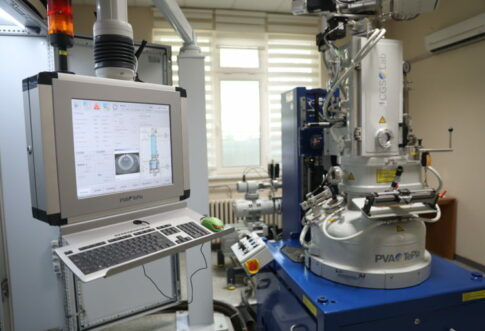Single Crystal Growth System
Brand / Model
PVA TePla / CGS Lab
Features
Cooling water specification: Up to 4.5 bar, 100 l/min
Inert gas: Argon (max. 100 l/min)
Crystal type: Silicon (single crystal)
Crystal diameter and length: ~100 mm ± 0.5 mm, max. 300 mm
Crystal weight: Max. 5 kg
Dopant type: n-type (phosphour)
p-type (boron)
Crucible material and volume: Quartz, max. 5,0 kg
Performance of power supply: Max. 50 kW
Current: Max. 1600 A
Operating bath temperature: Max. 1500 °C
Operating heater temperature: Max. 1600 °C
Aim
The Czochralski process is a method of crystal growth used to obtain single crystals of semiconductors. Monocrystalline silicon (mono-Si) grown by the Czochralski process is often referred to as monocrystalline Czochralski silicon (Cz-Si). It is the basic material in the production of integrated circuits used in computers, TVs, mobile phones and all types of electronic equipment and semiconductor devices. Monocrystalline silicon is also used in large quantities by the photovoltaic industry for the production of conventional mono-Si solar cells. High-purity, semiconductor-grade silicon is melted in a crucible at 1425 °C made of quartz. Dopant impurity atoms such as boron or phosphorus can be added to the molten silicon in precise amounts to dope the silicon, thus changing it into p-type or n-type silicon, with different electronic properties.
Click here for application
Duyurular
- “Dalgalı Sulara Dayanıklı Modüler Yüzer İskele Sitemi Tasarımı, Üretimi ve Geliştirilmesi” Konulu TÜBİTAK 1505 Projemiz Kabul Edilmiştir
- DEU ROV TEAM’i TEKNOFEST İnsansız Su Altı Sistemleri İleri Kategori Türkiye 2.’si Oldukları İçin Tebrik Ederiz
- “Gelişmiş Spektral Duyarlılık İçin ZnO/Si Ultraviyole Fotodedektör Geliştirilmesi” Konulu TÜBİTAK 1001 Projemiz Kabul Edilmiştir
- Young Researchers at EMUM!
- Genç Araştırmacılar EMUM’da!


